Camp Losey
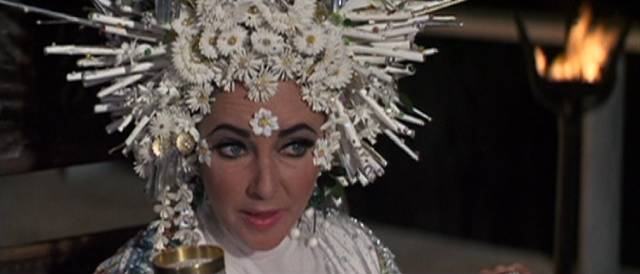
It’s hard to imagine a career like Joseph Losey’s in today’s movie industry. But I suppose that’s true of anyone who began back in the studio days and carried on into the less structured years between the collapse of the studios and the takeover of the industry by big corporations in the later 1970s. Between those two tight grips on production, there was room for experiment, for surprise, for taking chances and carrying on after individual missteps and failures.
Losey began in the late ’40s with a series of low-budget “social issues” movies, passing quickly from the overt allegory of The Boy With Green Hair (1948) to a series of gritty, noir-inflected thrillers – The Lawless (1950), M, The Prowler and The Big Night (all 1951) – before his career was derailed by the anti-Communist witch hunt which ruined the careers of many of the best people in Hollywood. Losey went into exile in England and worked for a few years under various pseudonyms. Perhaps not surprisingly, separated from his roots, Losey’s work in the ’50s lacks the clarity and focus of those early films; the social issues continued to surface – questions of crime and power – but he shifted between thrillers and melodramas as he searched for a voice in this new milieu.
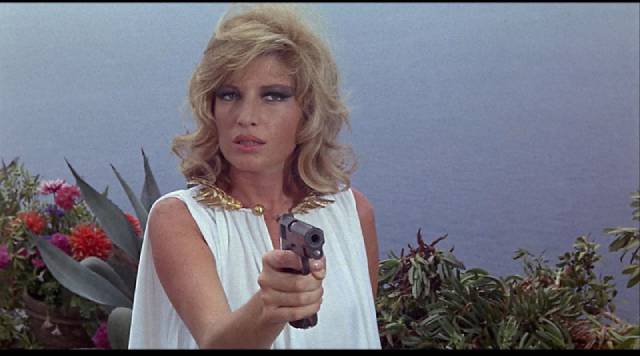
That voice came into focus in the early 1960s, emerging from Eva (1962) and The Damned (also 1962), fully formed in The Servant (1963). With that Harold Pinter-scripted dissection of class and psychological unease, Losey became something of a mainstream art film director, his tone serious – even grimly humourless – his subjects “important”, and the results at times risking pretension. How many filmmakers would follow the lush period romance of The Go-Between (1971) with the almost comically portentous The Assassination of Trotsky (1972), the latter casting global political struggle as perverse psychodrama?
Losey’s final decade was largely devoted to adaptations of plays (including an opera) and films shot in France (Mr. Klein [1976] is a particular stand-out). What kind of shape his career might have taken if he had not been driven out of the States in the early ’50s is hard to say – a sense of displacement and a constant searching for an identity seem to hang over his eclectic filmography. I confess that I’m not that interested in the later work, though I admire the early American films and the anomalous The Damned, and particularly The Servant. King & Country (1964), his rather stagy anti-war film, is dramatically effective, but feels redundant in the shadow of Kubrick’s Paths of Glory (1957), and I was unable to sit through the award-winning The Go-Between because I found Michel Legrand’s tinkly piano score so distracting.
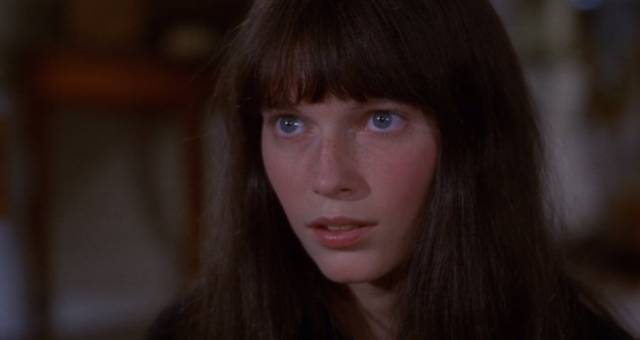
To be honest, I find the odd diversion Losey took in the late ’60s to be his most interesting and entertaining period, though admittedly not his most artistically rewarding. After the artistic focus of The Servant and the austerity of King & Country, Losey plunged into decadence and flamboyant excess in three movies which virtually define camp. All three are lushly produced, with superb widescreen photography which makes them visually immersive even as they confound the viewer with their narrative idiosyncrasies. One is something of a dud, one a superb Gothic melodrama, and the third an unclassifiable folly.
*
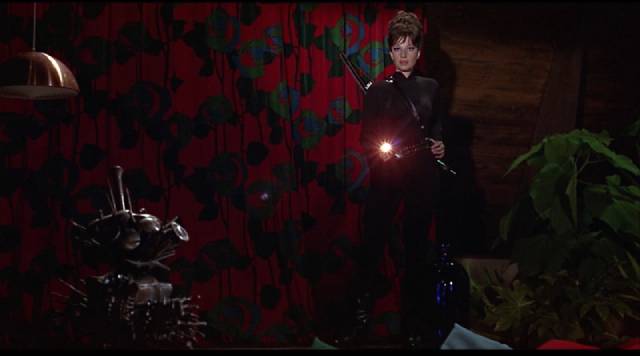
Modesty Blaise (1966)
The dud is Modesty Blaise (1966), an attempt to launch an international franchise with a female equivalent of James Bond in the form of super-thief Modesty Blaise, who is called in by British intelligence for a sensitive mission. Based on the comic strip and pulp thrillers by Peter O’Donnell, with a script by Evan Jones (his fourth for Losey), the plot – involving a shipment of diamonds which has been targeted by criminal mastermind Gabriel (Dirk Bogarde) – gets lost amidst the multinational locations and opulent decor, which in itself wouldn’t be a big problem (after all, the plots of most Bond movies are merely there to hang action set-pieces on), but this kind of film requires a sense of humour, which is something Losey had not previously displayed and shows no sign of here.
The production is mounted on an impressive scale, with Jack Hildyard’s photography making the most of the travelogue element – London, Amsterdam, Naples – but Losey’s attempt at tongue-in-cheek adventure is completely leaden. It doesn’t help that Monica Vitti was cast as Modesty; as an image, she’s fine, but the inexpressiveness which worked so well in her films for Antonioni creates a vacuum at the centre of the movie – which is only aggravated by her apparent lack of comfort with delivering her performance in English.
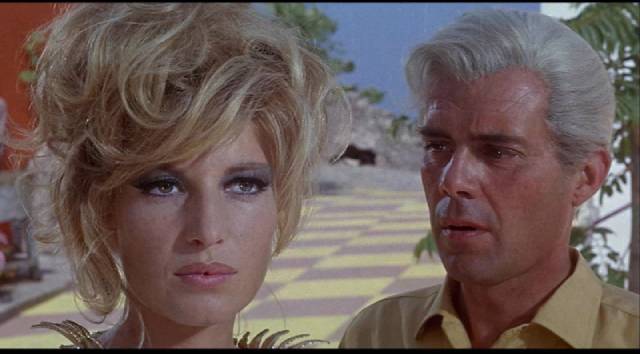
But even worse still is the script which, rather than making her the active centre of the narrative, gives her little agency. She’s manipulated from beginning to end by the stuffy bureaucrats of British intelligence. Although visually Modesty seems to be the female equivalent of Mario Bava’s Diabolik, at no point is she in control of events; where she should be ahead of everyone else, she is a mere victim of events instigated by others.
The only one involved who seemed to understand all the pulpy hokum is Bogarde, who milks the part of Gabriel for all the effete, decadent humour it’s worth. Terence Stamp as Modesty’s sidekick Willie Garvin overdoes the broad working class thief bit to the point of tedium while Harry Andrews and Alexander Knox could have been dropped in from any spy movie of the period.
Apparently Losey took the project on because he thought it would be fun; unfortunately, whatever amusement he personally gleaned from the job isn’t transmitted to the audience.
*
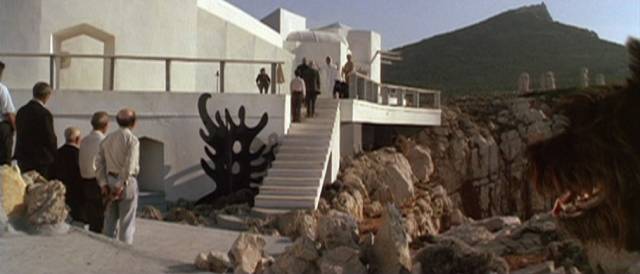
Boom (1968)
Boom, or Boom! (1968), is something very much else. Adapted by Tennessee Williams himself from his own unsuccessful play The Milk Train Doesn’t Stop Here Anymore, the film exists purely as a showcase for celebrity couple Elizabeth Taylor and Richard Burton and Losey goes all-out to convey their status as beyond the merely human; the movie salutes them as godlike icons of decadence and they embrace the opportunity to chew the scenery with unfettered abandon. And what scenery!
While a viewer might stare with permanently dropped jaw, Boom is a visually exquisite experience. Shot on the rocky coast of Sardinia and in the De Laurentiis studios in Rome, every image captured in luminous widescreen by the great Geoffrey Unsworth takes your breath away. Despite the awfulness of the people living in this gorgeous villa, you want to move there yourself. Few films have created such an enticing location; and even fewer have allowed the location to overwhelm the characters and story so completely, despite the strenuous efforts of a famous cast to grab and hold your attention.
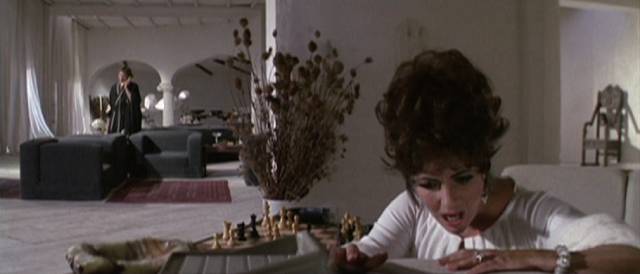
And Liz and Richard do exert Herculean efforts to make you watch them – though it’s open to debate whether this was merely an expression of over-inflated egos or a desperate attempt to compete with landscape and decor which they must have felt constantly diminishing their larger-than-life scale.
Liz is Sissy Goforth, the fabulously wealthy widow of multiple husbands, living on her own island in the Mediterranean where she rules ruthlessly over the native inhabitants who live by fishing. She has a staff which she abuses – and whose language she hasn’t bothered to learn. She also has a secretary (Joanna Shimkus), to whom she’s dictating her memoirs, and a live-in doctor who provides her endless drugs and blood transfusions to keep her going. Despite the latter, her health is failing … she feels almost constant pain and as the movie progresses her chronic cough gets worse and she leaves the villa littered with blood-soaked tissues. Despite her wealth, she lives with a constant neurotic fear of death, collapsing frequently into a state of what the Victorians called “the vapours”.
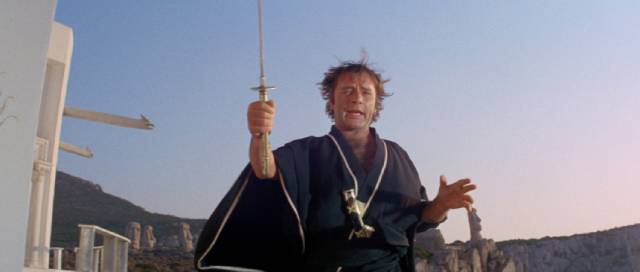
Her paranoid isolation is interrupted one day with the arrival on the island of a seeming vagabond named Chris Flanders (Burton), who turns out to be a failed poet now known as “the angel of death” because of his avocation of seeing wealthy women across the threshold to the other side. Naturally, his presence terrifies Mrs. Goforth because it seems to portend her own imminent end. Over almost two hours, Liz and Dick yell at each other, proclaim deep thoughts, toy with food and drink which they never actually consume, and seemingly take forever to get to the point. This pas de deux is interrupted occasionally by prickly exchanges between the widow and her secretary, who is disgusted by her boss’s behaviour towards Flanders, and by the arrival for dinner of the Witch of Capri – a role originally offered to Katherine Hepburn (who was appalled) and ultimately given to Noel Coward, who revels in the opportunity to play an old queen.
With Burton prancing around in a samurai’s kimono, waving a katana, and Michael Dunn watching over the villa with attack dogs and pistol as the widow’s fascistic head of security (his dogs have already killed one of the local peasants and almost tear Flanders apart when he arrives), and Liz wearing increasingly flamboyant outfits, Boom flaunts itself as some kind of pastiche – but of what? Was Williams mocking his own overheated oeuvre, sending up Cat on a Hot Tin Roof, A Streetcar Named Desire and Suddenly, Last Summer?
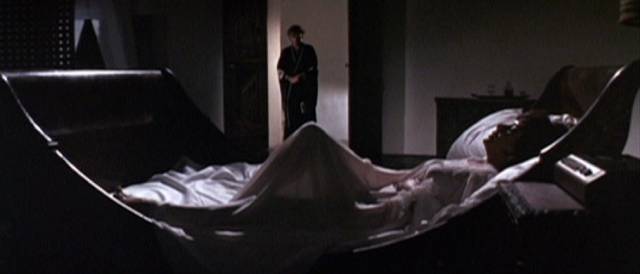
Despite the striking visual achievement of the film, it never comes into focus, failing to make it clear what Williams and Losey are trying to convey – other than a strange homage to the cultural phenomenon of Taylor and Burton, which in itself was steeped in an air of parody, a tabloid vision of the unrestrained decadence of manufactured celebrity.
Boom remains indescribable and has to be seen to be believed. It’s easy to see why it’s a favourite of John Waters, whose own work might stand as an act of homage and adoration (as Waters himself has pointed out, towards the end Liz Taylor took on an uncanny resemblance to Divine). It’s a film to embrace for its mad miscalculations and its perverse aesthetic achievement.
*
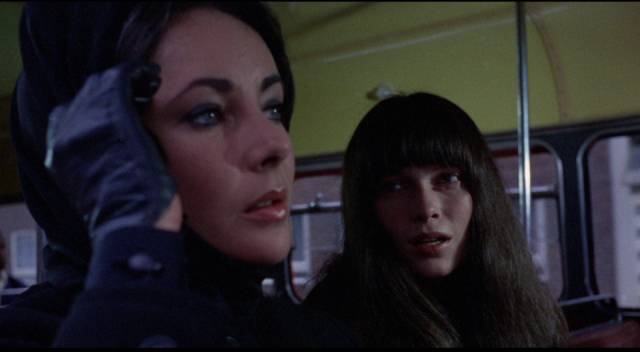
Secret Ceremony (1968)
Losey followed the debacle of Boom with another vehicle for Liz Taylor, a deliriously overwrought psychodrama called Secret Ceremony (also 1968, and remarkably released just five months after Boom). Loosely based on a short story by Argentinian writer Marco Denevi, adapted by Hungarian George Tabori, unlike the previous two films, Secret Ceremony is narratively, psychologically and tonally coherent, a melodrama of familial dysfunction fuelled by a stew of perversion and madness. Losey makes excellent use of an eccentric mansion in London’s Holland Park as a setting for this pulp tragedy, beautifully shot this time by Gerry Fisher.
Liz is Leonora, a fading middle-aged prostitute who still grieves for the daughter she lost years ago. While taking the bus one day to visit the child’s grave, she’s spotted by Cenci (Mia Farrow), a waif-like young woman who uncomfortably squeezes into the seat beside Leonora and stares at her silently. When Leonora gets up to leave the bus, Cenci utters a single word loaded with a grief of her own: “Mommy.” The waif follows Leonora to the church, finally speaking to her at the graveside. She invites the older woman home … a ridiculously vast home (it was built for Ernest Ridley Debenham, of the famed Debenham department store, in 1905) in which Cenci lives alone.
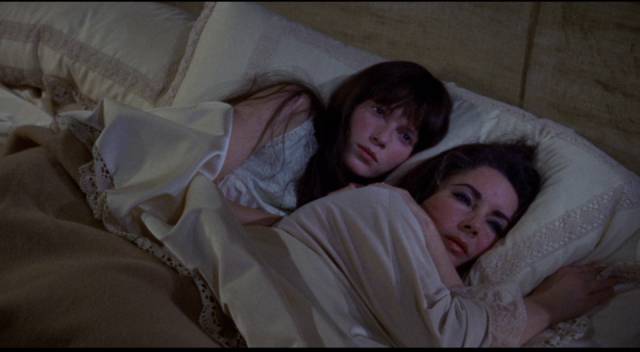
Leonora is impressed by the opulence and quickly realizes that Cenci has taken her for her dead mother – there is a vague resemblance to a photograph. Seeing profit in this, Leonora plays along, although Cenci is obviously very unstable. Things become more complicated when Cenci’s stepfather Albert turns up, not knowing that her mother had died, but quickly spotting how Leonora is taking advantage of the girl’s madness. Not that he’s in a position to take the moral high ground, apparently having raped Cenci as an adolescent before heading back to America.
Queasy sexual undercurrents run through the formation of this unstable impromptu family. Both Leonora and Albert are quite open about their exploitation of Cenci’s madness to get what they can out of the estate. The competition between Albert and Leonora for control over Cenci inevitably leads to collapse – Cenci, abandoned by both, kills herself, and Leonora having in a sense now lost her daughter all over again stabs Albert to death at the funeral.
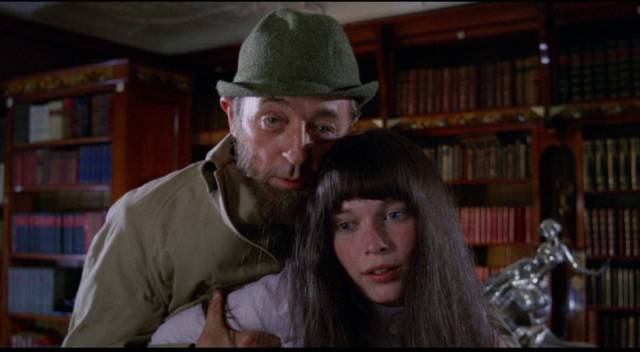
Secret Ceremony is like some Jacobean tragedy, steeped in amplified emotions, betrayals and revenge, often uncomfortable for the unwholesomeness of the emotions fuelling the drama. But unlike Modesty Blaise and Boom, here Losey is in complete command of the material and the result is something like a marriage between Douglas Sirk and Roman Polanski. Taylor embraces an unattractive part (her accent shifts about quite a bit, but that can even be plausibly attributed to the fact that Leonora has no real core identity but plays various roles to suit different people and situations), while Farrow is fascinating as the mad child-woman (whose name refers back to Beatrice Cenci, the 16th Century daughter of a noble Roman family, who was tried and executed at age twenty-two for murdering her violent and dissolute father, who had repeatedly raped her), her performance generating genuine pathos even as it disturbs.
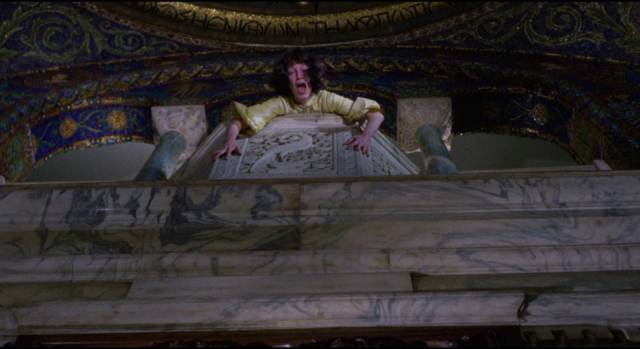
Perhaps less comfortable in his role is Robert Mitchum as Albert, although the sense that the actor is a little lost in the midst of all the heightened female energy surrounding him works in his favour, making the masculinity which had run through his entire career seem seedier than ever before – he’s emblematic of the forces which have generated so much female grief and madness in a society which favours men’s power.
Along with The Damned, Secret Ceremony is my favourite Losey film.
*
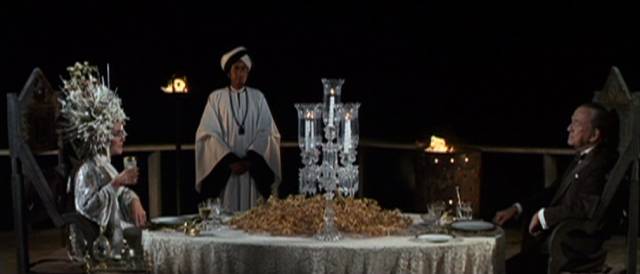
All three movies have been served well on Blu-ray, Modesty Blaise from Kino Lorber, Boom from Shout Select and Secret Ceremony from Indicator. The transfers are uneven (Modesty Blaise has some glaring edge enhancement, particularly in the first reel), but all reveal Losey’s skills as an image maker which never failed him even when he faltered dramatically.
Modesty Blaise has a commentary by David Del Valle and Armand Mastroianni, plus interviews with Losey’s son, assistant director Gavrik Losey, writer Evan Jones and assistant art director Norman Dorne.
Boom has a commentary from uber-fan John Waters, and an interview with film critic Alonso Duralde who makes a noble effort to explain the film’s appeal to those who love it.
Secret Ceremony has a commentary from critics Dean Brandum and Alexandra Heller-Nicholas, an interview with Gavrik, and an archival interview with Losey from French television. The oddest extra is additional material from the first and last reels shot with no involvement from Losey to provide a frame for American broadcast television; these scenes, between two characters not seen anywhere else in the film, were intended to “explain” the narrative and make sure that Leonora didn’t get away with killing Albert – a psychiatrist tells the whole story to a solicitor, who after hearing the facts agrees to defend Leonora at her upcoming murder trial. It’s a fascinating glimpse of how someone might try to normalize the perversity of a film which is completely unconcerned with ordinary morality.
Comments